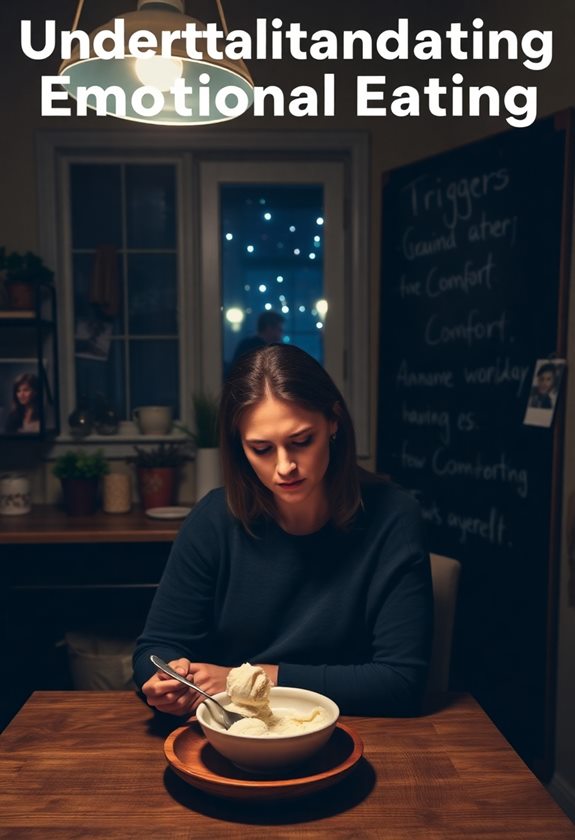Emotional eating happens when you turn to food for comfort instead of hunger. 🤔 It's often sparked by stress, boredom, or loneliness. Recognizing when you're eating from emotions, not hunger, is key. Have you tried keeping a food diary? This can highlight your triggers. Instead of snacking, pause and ask yourself if you're truly hungry. Finding healthier ways to cope, like exercise or journaling, can help too.💪 It's all about creating a supportive environment and making small changes one step at a time. 🌱 If this resonates with you, there's more to discover about managing these habits effectively!
Key Takeaways
- Emotional eating is a coping mechanism triggered by stress, boredom, loneliness, or social situations, leading to unhealthy eating patterns.
- Identifying triggers through a food diary helps differentiate between emotional eating and true hunger.
- Engaging in alternative coping strategies, such as exercise or hobbies, can effectively reduce emotional eating behaviors.
- Mindfulness techniques and journaling promote emotional processing, helping to manage feelings without resorting to food.
- Seeking support from friends or professionals can provide encouragement and resources for overcoming emotional eating challenges.
Defining Emotional Eating

Emotional eating is a common coping mechanism where people turn to food for comfort during stress or emotional turmoil. Have you ever reached for a snack when you felt overwhelmed? You're not alone! Many people find themselves eating when they're sad, anxious, or even bored. This isn't just about hunger; it's about feelings. In fact, understanding the relationship between food and emotions can be essential for developing healthier habits and achieving weight loss goals, as highlighted in meal prep strategies.
When you eat to soothe your emotions, you might feel better in the moment, but it often leads to guilt or regret later. Think about it: does a slice of cake really solve your problems? It might taste good, but it doesn't fix what's bothering you.
Emotional eating can become a habit. You might start to associate food with comfort, making it harder to deal with feelings in healthier ways. For example, instead of reaching for chips when stressed, you could go for a walk or talk to a friend.
Recognizing emotional eating is the first step to changing it. Ask yourself, "Am I really hungry, or is something else going on?" By understanding this pattern, you can begin to find new ways to cope. Remember, it's okay to seek help and find healthier outlets!
Common Triggers and Causes
Many factors can trigger emotional eating, often stemming from deep-seated feelings or external pressures. Have you ever reached for snacks after a long day at work? Stress is a huge trigger for many people. When life gets overwhelming, food can feel like a comforting escape. Additionally, structured meals through meal preparation can help regulate emotions by providing a sense of control and routine. Another common cause is boredom. When you're stuck at home or feeling unmotivated, it's easy to turn to the fridge for a little distraction. Ever found yourself mindlessly munching while binge-watching your favorite show?
Moreover, loneliness can push you toward food for comfort. It's not just about hunger; it's about filling an emotional void. Think about times when you've celebrated with cake or gathered with friends over dinner. These social situations can spark cravings, too!
Lastly, let's not forget about habits. If you've always turned to food when feeling down, that pattern can be hard to break. Recognizing these triggers is the first step toward managing them. So, next time you reach for that snack, ask yourself, "Am I really hungry, or is something else going on?"
The Psychology Behind Emotional Eating

Understanding the psychology behind emotional eating reveals how our minds can influence our relationship with food. Have you ever found yourself reaching for snacks when you're feeling stressed or sad? You're not alone. Many people use food as a way to cope with emotions. This behavior often comes from learned habits formed during childhood, like celebrating with cake or seeking comfort from a bowl of ice cream after a tough day. These patterns can be exacerbated by a lack of proper meal planning, where nutrient-dense foods that support emotional well-being are overlooked in favor of quick, unhealthy choices that may provide temporary comfort. By focusing on a balanced diet, you can help mitigate the emotional triggers that lead to unhealthy eating.
When you eat to soothe your feelings, your brain releases chemicals that make you feel good, creating a cycle that's hard to break. You might start to associate food with comfort, even if it doesn't solve your problems. This can lead to unhealthy eating patterns and weight gain, which can further affect your mood.
It's important to recognize these patterns. Ask yourself, *Are you really hungry, or are you feeling something else?* By understanding your emotions, you can start to change your relationship with food. Remember, food is just fuel for your body, not a solution for your feelings. So, next time you're tempted to snack out of emotion, take a moment to check in with yourself.
Strategies to Combat Emotional Eating
To tackle emotional eating, it's crucial to dig into your habits and identify triggers that prompt you to reach for food when you're not truly hungry. Start by keeping a food diary. Note what you eat, along with your feelings at that moment. You might discover patterns—like eating when stressed or bored. Isn't it eye-opening to see how emotions can influence your choices?
Next, try to pause before you snack. Ask yourself, "Am I really hungry, or is this just boredom?" If it's not hunger, find another way to cope. It could be taking a walk, calling a friend, or diving into a hobby.
Also, create a supportive environment. Stock your kitchen with healthy snacks instead of junk food. When you crave something, you'll have better options.
Building Healthier Coping Mechanisms

Recognizing when you're reaching for food out of emotion is a significant first step, but it's equally important to replace those habits with healthier coping mechanisms. Have you ever noticed how you feel after binge-watching your favorite show instead of snacking? Finding activities that distract you can really help.
Exercise is a fantastic outlet. A brisk walk or a quick workout can boost your mood and reduce stress. Have you tried journaling? Writing about your feelings can help you process emotions without turning to food.
Mindfulness techniques like deep breathing or meditation can also work wonders. Just take a few minutes to focus on your breath and let go of negative thoughts.
What about connecting with friends? Talking to someone about your feelings can lighten your emotional load. You might find comfort in shared experiences.
Lastly, remember to celebrate small victories! Every time you choose a healthier option, you're building new habits. It's not about perfection; it's about progress. So, what healthier coping strategies will you try today? 😊

